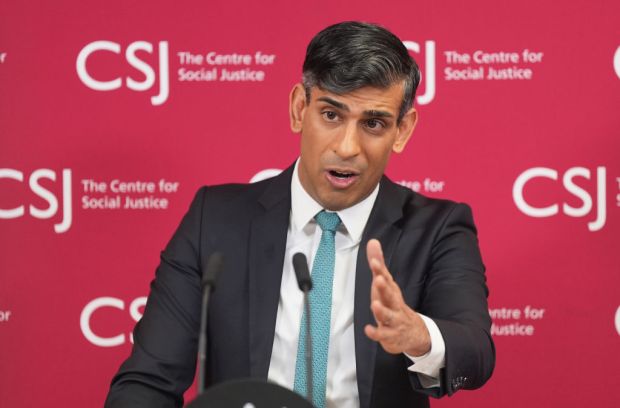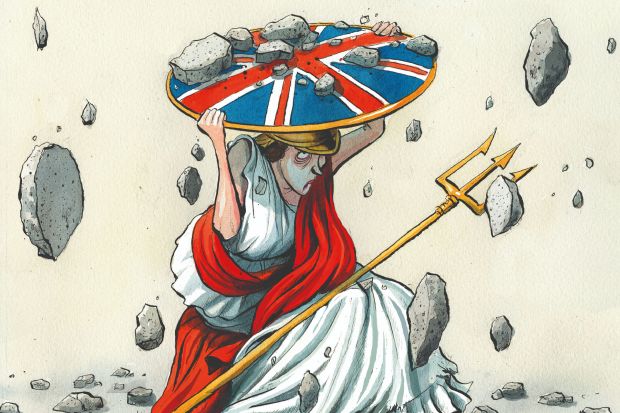Liz Truss is almost exactly the leader the country is desperate for. Britain needs someone to take painful decisions and even alienate voters in order to get growth going. Given that the next election is probably lost anyway, there is a case to be made that Truss should serve as the sin-eater for Conservative policy, implementing necessary but unpopular actions before she’s deposed. Last night rumour had it that she was planning to break the triple lock on pensions, instead bringing in a below-inflation rise. Perhaps this was to be one of those unpopular but necessary policy decisions? Not a bit of it. At PMQs, she told the Commons: ‘I’ve been clear, we are protecting the triple lock on pensions.’
The triple lock says that each year the state pension will increase by inflation, average earnings, or 2.5 per cent, whichever was highest in the year before. It is hugely popular with the Conservative party’s elderly base. It is also a fiscal and economic millstone around the British government’s neck.
The last two years have amply illustrated the basic problems with the design of the scheme. The first is that it was clearly not created with unusual economic circumstances in mind. In 2021, wages dropped in a short but deep recession. The next year, they went back up again. In economic terms, very little had changed. The rule used by the triple lock, however, treated this like a period of strong economic growth. If it had been left untouched, pensions would have increased by 8 per cent. And thanks to the ratcheting effect of the triple lock mechanism, they would have retained that boost against UK GDP into the long term.
In the end, the government ended up suspending the triple lock for a year, only to fall right into another unusual situation: stagflation, where economic activity stagnates but inflation skyrockets. Again, the triple lock recommends a large boost to pensions when government finances are already under strain, and again, this would lift up pensions as a share of GDP long term. And again, the government should suspend the rule to avoid this. But it seems Liz Truss has bottled it.
You would have thought it tempting for the Conservative party to wave these away as two unusual years; in normal times – when GDP, inflation, and earnings increase together – then everything would be fine, right? Well, no. The way the triple lock is designed means that whenever you have a downturn, pensions will tend to rise as a share of GDP. And whenever you have a boom, they keep pace. The net effect is a constant ratchet where pensions, in the words of the work and pensions select committee, take up an ‘ever-greater share of national income’.
This is not sustainable. Spending on the state pension is already set to rise significantly as a share of GDP over the coming decades; as the population gets older, there are more people claiming pensions and fewer working to pay for them. Add the triple lock into the mix, and you double the expected increase in demand. Scrapping the arbitrary 2.5 per cent element doesn’t do a lot to help, either; you still have significant growth through the ratcheting effects of the first two elements.
More than just unsustainable, it isn’t particularly just. No matter how many times people tell you they paid their share, the state pension is a benefit, funded out of current taxes and borrowing. That’s why it’s possible to have a triple lock in the first place; what people get out bears very little relationship to what they put in. The argument that pensioners are poor, meanwhile, is out of date; pensioners are less likely to be in poverty than the general population, are likely to own their own homes, and generally have significant wealth to draw upon. Young people – whose taxes pay for these pensions – do not have these advantages, and have higher financial needs associated with starting and raising families.
Given that it’s unjust and unsustainable, scrapping the triple lock would be a genuinely good move for the country. The problem is that it would be a disaster for the Conservative party, which is dependent on its very own anti-growth coalition to win its seats. This is no doubt why Liz Truss decided she was unable to reform the state pension. But the problem remains: elderly voters don’t work because they are retired; their stake in the economy is generally limited to what they can extract from it through public services and benefits, and the value of their assets. In turn, this means that the electoral incentive is to simply keep buying their votes, rather than pursue pro-growth policies.
In the short term, pursuing this strategy has won the Conservatives a decade in power. In the longer run, it could kill them as a party. The party is essentially eating the seed corn, making Britain poorer, at huge cost to the young people who might have one day have considered voting for them.
Got something to add? Join the discussion and comment below.
Get 10 issues for just $10
Subscribe to The Spectator Australia today for the next 10 magazine issues, plus full online access, for just $10.



















Comments
Don't miss out
Join the conversation with other Spectator Australia readers. Subscribe to leave a comment.
SUBSCRIBEAlready a subscriber? Log in